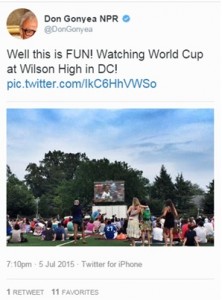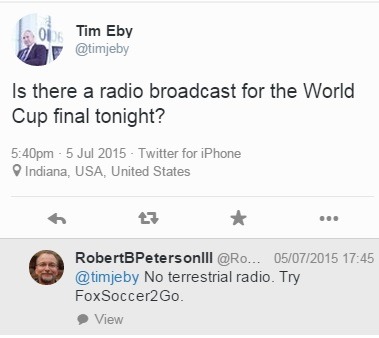 You could hear the fireworks throughout all 50 states the other night. And I’m not talking about Independence Day celebrations or the neighborhood kids shooting off Roman candles. This was about celebrating an amazing victory for a team of young women competing at the highest level on the world stage.
You could hear the fireworks throughout all 50 states the other night. And I’m not talking about Independence Day celebrations or the neighborhood kids shooting off Roman candles. This was about celebrating an amazing victory for a team of young women competing at the highest level on the world stage.
On Sunday night, a record TV audience of nearly 22 million people tuned in to see a pumped- up team of American women earn the FIFA World Cup trophy in a rousing victory against Japan. (And that television ratings performance came within one million viewers of the level reached in the 2014 World Series’ Game 7, according to NPR.)
The broadcast radio audience for this event?
Zero, nada, nothing.
That’s because hundreds of sports radio stations across the country were forced to air meaningless baseball games, shopworn talk shows, and other totally forgettable programming, rather than this historic global sporting event hosted in Vancouver, BC.
On an otherwise lazy Sunday evening wrapping up a long three-day weekend, Americans were enthralled by the possibility of a world soccer championship. And on the most patriotic of weekends, it was exhilarating to root for the U.S. on the biggest of stages.
NPR’s Don Gonyea tweeted a picture of a group of rabid fans in D.C. watching the match on a big screen TV at a neighborhood high school. And that was just a taste of the many groups that came together to enjoy a shared moment of pride and patriotism. In Chicago’s Lincoln Park, 7,000 fans came together to watch this championship event.
There’s no doubt this game was very likely a big deal in your community, too, as reports of these types of gatherings proliferated at stadiums, parks, and other gathering spots at cities and towns throughout America – and of course, the world.
And yet somehow, broadcast radio missed this event entirely, sending millions of listeners off on a futile effort trying to find the play-by-play on a local AM/FM station.
I became aware of the broadcast radio void Sunday afternoon on Twitter, when Tim Eby of St. Louis Public Radio sent off this question to his followers:
No broadcast radio coverage of this historic event?
Somehow with all these national sports radio networks that include ESPN, NBC, CBS, and Fox, there was no broadcast radio play-by-play. For a format that continues to rack up new affiliates, all those AM/FM sports outlets and their millions and millions of fans were denied access to this match on broadcast stations. Somehow, a deal was never brokered to carry these games, in spite of their rampant popularity throughout America. I get you can think of a lot of AM sports stations, in particular, that would have benefited greatly from carrying a game of this magnitude.
But aside from the Internet on TuneIn, the only other “radio” outlet was Sirius/XM, which simulcast the Fox TV play-by-play of the championship match  to its subscriber base.
to its subscriber base.
It wasn’t that many years ago when radio networks and local stations could afford to miss an event, and not pay a price. After all, if it wasn’t on broadcast radio, there were no other options.
Today, the choices are many, and consumers know how to find the content they desire. Our Techsurveys continue to show that high Net Promoter Scores – that measurement of loyalty – are hard to come by for local sports radio stations. That’s because fans know they can flip between many different sports sources – online and over the airwaves –to satisfy their voracious sports jones in real time, whenever they like.
It is hard to generate true loyalty in an environment where scores, fantasy updates, podcasts, videos, talk shows, and play-by-play coverage are seemingly everywhere for connected fans.
That was the case on Sunday night, and sadly, broadcast radio took a tough loss, further moving it away from relevancy and currency in this changing media world. And this lost chance to celebrate an amazing victory has less to do with ratings, and more to do with being a part of the zeitgeist of a truly victorious American moment where pride and emotion in all shapes, sizes, and color abounded.
Former ESPN Radio exec and WBAL-AM/Baltimore programmer, Scott Masteller, called it “a big missed opportunity” for radio.
He’s right, of course.
And we should be kicking ourselves.
- The Exponential Value of Nurturing Radio Superfans - April 28, 2025
- What To Do If Your Radio Station Goes Through A Midlife Crisis - April 25, 2025
- A 2020 Lesson?It Could All Be Gone In A Flash - April 24, 2025





Good read, Fred.
For what it’s worth, we did call our network affiliate and the game wasn’t available to carry..which is unusual, as they did carry the semi finals and finals of the men’s world cup last year. So, yes a big miss for radio..
But even a bigger miss for many (not us, fortunately) was the lack of presence that evening for social outlets for radio. As you know, Twitter (and FB, Instagram, etc) exploded during that game..especially in the first half. Crazy scoring and national pride abounded and most stations (and TV for that matter) we’re pulling in pre-programmed posts and clients “partnerships”. After all, it was a “holiday weekend” right 🙁
The fact that on many/most stations, you could swing a dead cat and not hit anything about that game socially is as sad a story to the “care quotient” and “flexibility” of our industry these days as the lack of availability of the game on broadcast, IMO.
Dave, you are correct that the social story is as big a miss. And between it being a holiday weekend and a Sunday, it’s a missed opportunity to connect with fans and enjoy a truly wonderful experience with them. It is a mystery why the PBP was MIA, but as you note, the social gap underscores the lack of importance radio still places on this connection network. Thanks for the comment.
I think the bigger story here is how all media completely ignored Hope Solo’s domestic violence. If this were any other sport, that would have been the top story every single day.
Don, the media coverage choices from Donald Trump to Bill Cosby to Charlie Sheen have always been something of a mystery. Are there certain celebrities that have a sort of immunity or is the onslaught of coverage going to start now?
Well the media ignored the domestic violence about as much as they ignored the entire sport. It’s interesting just how HUGE a women’s soccer win has to be to get noticed by the generally male-managed sports networks. Fox Sports had the coverage and did a superb job of leveraging their investment across their brands and social media. The rest of the jock-sniffers should be embarrassed by the stunning lack of knowledge they displayed of a sport that millions of families rally around weekly on soccer fields across the USA. The only people looking more clueless than the Japanese on that night were American sports anchors.
Jack, thanks for these comments about how soccer coverage – from the domestic violence story to the sport itself – continues to be out of sync with interest levels here in America. Now I’m very curious as to why TSN had the radio rights in Canada, but no American-based sports radio network followed suit here. Was it about under-estimating fan interest, an issue with FIFA, or something else? At any rate, radio and its millions of listeners lost out on a night when so many were driving home at the end of a holiday weekend.
Add to the list of “no longer available” – Stanley Cup Finals. No terrestrial feed available!
Wow – not a great trend, Brian. Thanks.
Women World Champs and Championship NHL. Talk about asleep at the switch!
Not a good sign, Clark.
Good read 🙂
Thanks, Pawel!